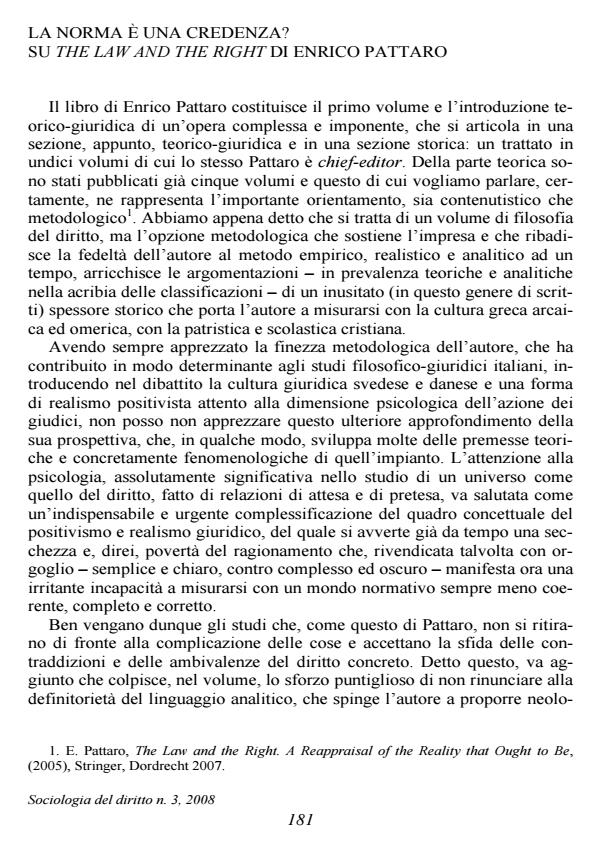La norma è una credenza? Su The law and the Right di Enrico Pattaro
Titolo Rivista SOCIOLOGIA DEL DIRITTO
Autori/Curatori Alfonso Catania
Anno di pubblicazione 2009 Fascicolo 2008/3 Lingua Italiano
Numero pagine 12 P. 181-192 Dimensione file 135 KB
DOI 10.3280/SD2008-003007
Il DOI è il codice a barre della proprietà intellettuale: per saperne di più
clicca qui
Qui sotto puoi vedere in anteprima la prima pagina di questo articolo.
Se questo articolo ti interessa, lo puoi acquistare (e scaricare in formato pdf) seguendo le facili indicazioni per acquistare il download credit. Acquista Download Credits per scaricare questo Articolo in formato PDF

FrancoAngeli è membro della Publishers International Linking Association, Inc (PILA)associazione indipendente e non profit per facilitare (attraverso i servizi tecnologici implementati da CrossRef.org) l’accesso degli studiosi ai contenuti digitali nelle pubblicazioni professionali e scientifiche
Is Law a Belief System? On Enrico Patttaro’s The Law and The Right - Enrico Pattaro’s volume The Law and the Right features an appreciable finesse of argumentation and an analysis of unusual historical density. The attention paid to psychology absolutely significant when studying an area like that of law, which comprises relationships of expectation and of claim is deserving of recognition as an indispensable, urgent complexification of the conceptual framework of legal positivism and realism, whose reasoning has for some time been manifesting a degree of aridity and, I dare say, poverty. The author identifies the fact that Hart is treated as having espoused the psychologically-inclined realist school as a consequence of the realistic attention to describing normative attitudes as somewhat forced reasoning. These normative attitudes that Hart analyses by drawing a distinction between the internal and the external point of view can hardly be reduced to mere internal experiences that are pregnant exclusively in empirical psychological terms. While the epistemological option in favour of a radical, materialist, psychologist monism expounded in Pattaro’s book on the one hand stimulates a valuable investigation into the mental and social dynamic immanent to reality (which must be), no less than the plane of reality that is, on the other hand it runs the risk of casting a shadow on the dimension of designing and transforming reality practised by those who generate norms (marginal in volume compared to the prevalence of believers who make them what they are by the very act of believing in them), thus blacking out the dialectic tension between law and facticity, obedience and effectiveness. This is a classical objection to radical realism that is not overcome by the attention paid by Pattaro to the normative dimension "in the relative sense".;
Alfonso Catania, La norma è una credenza? Su The law and the Right di Enrico Pattaro in "SOCIOLOGIA DEL DIRITTO " 3/2008, pp 181-192, DOI: 10.3280/SD2008-003007